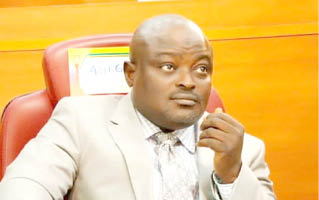Members of the Lagos State House of Assembly on Monday impeached Mudashiru Obasa as speaker, a position he had held since 2015.
His removal followed a series of controversies, including his recent comments about the 2027 governorship race in Lagos and allegations of mismanagement of state funds.
At the plenary yesterday, lawmakers unanimously voted to remove Obasa, replacing him with Mojisola Meranda, the representative for Apapa I. Meranda’s election makes her the first female Speaker of the Assembly. Fatai Mojeed, the Deputy Chief Whip, was also elected as Deputy Speaker.
The impeachment motion was moved by Femi Saheed (Kosofe Constituency II) and seconded by Aro Moshood Abiodun (Ikorodu Constituency II).
Wanted ‘Boko Haram member’ arrested in Ekiti
Court orders detention of suspects who planned launch of Boko Haram cell in Osun
Allegations against Obasa included gross misconduct, poor leadership, high-handedness, intimidation, suppression of members, misappropriation of funds, and lack of transparency.
Obasa’s controversial comments on the 2027 governorship race had made headlines last November. While Governor Babajide Sanwo-Olu presented the 2025 budget, Obasa declared that he was neither too young nor lacking in experience to run for governor, remarking that “those who have been before me are not better off.” He also denied any attempts to validate his candidacy through a familial connection in Ojo.
In addition, Obasa faced accusations of spending N17 billion on a gate to the Assembly complex, a claim that drew public criticism. The Lagos State Anti-Corruption Coalition demanded an investigation into the alleged expenditure.
Defending himself, Obasa dismissed the gate allegations, calling them part of a political smear campaign tied to the 2027 election. He also denied spending N200 million on a thanksgiving service for Assembly staff, claiming it was “funny” that such rumour circulated.
How his fate was sealed
Obasa’s impeachment came as a surprise to many, including the former Speaker himself. Sources in the Assembly revealed that he had expected to be removed during the first sitting of the House in 2025.
His downfall seemed inevitable following tensions within the All Progressives Congress (APC). During a December meeting, President Bola Tinubu and the Governance Advisory Council (GAC) reportedly accused Obasa of making divisive statements regarding his gubernatorial ambition. Tinubu also reprimanded Obasa for disrespecting Governor Sanwo-Olu and instructed him to align with the governor on key matters, including the approval of nominees for the Lagos State Independent Electoral Commission (LASIEC).
It was gathered that it was the tone of the president during the meeting that gave the greenlight for his removal. Members of the GAC believed Obasa had violated the party’s tradition of exercising restraint in succession matters, thus “heating up the polity” ahead of the 2027 election.
The rift between Obasa and Governor Sanwo-Olu became more evident when the governor signed the 2025 budget into law without Obasa’s presence. Lukman Olumoh, the Chairman of the House Committee on Budget and Economic Planning, led other members to the State House for the signing.
In response to the impeachment, Lagos APC spokesman Seye Oladejo stated that the party was not divided by the event. “It shows that democracy is growing. We respect the independence of the Executive, Legislature, and Judiciary. The process was seamless, with no violence, and the party is united in its support for the democratic process,” he stated.

 Join Daily Trust WhatsApp Community For Quick Access To News and Happenings Around You.
Join Daily Trust WhatsApp Community For Quick Access To News and Happenings Around You.


